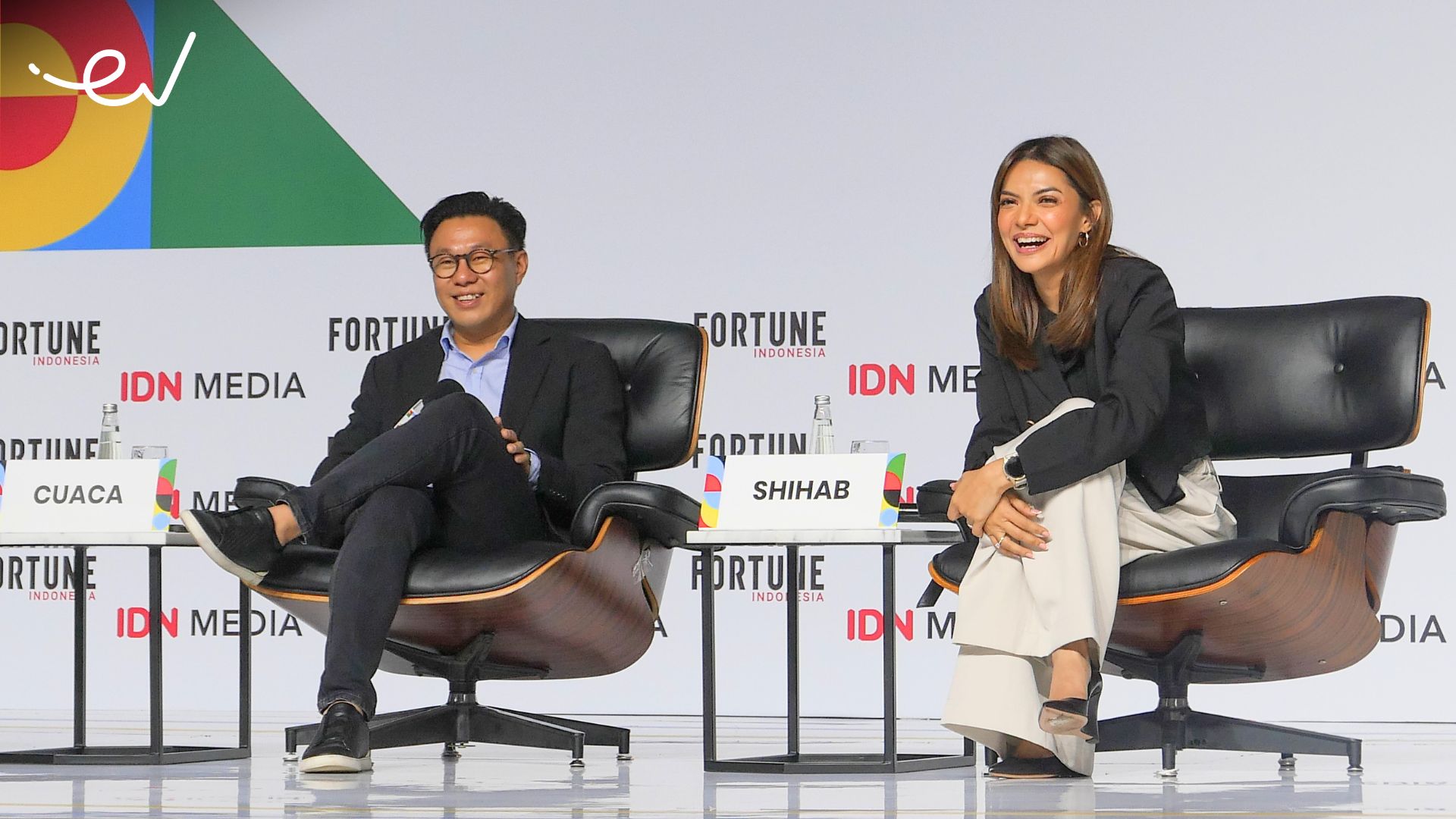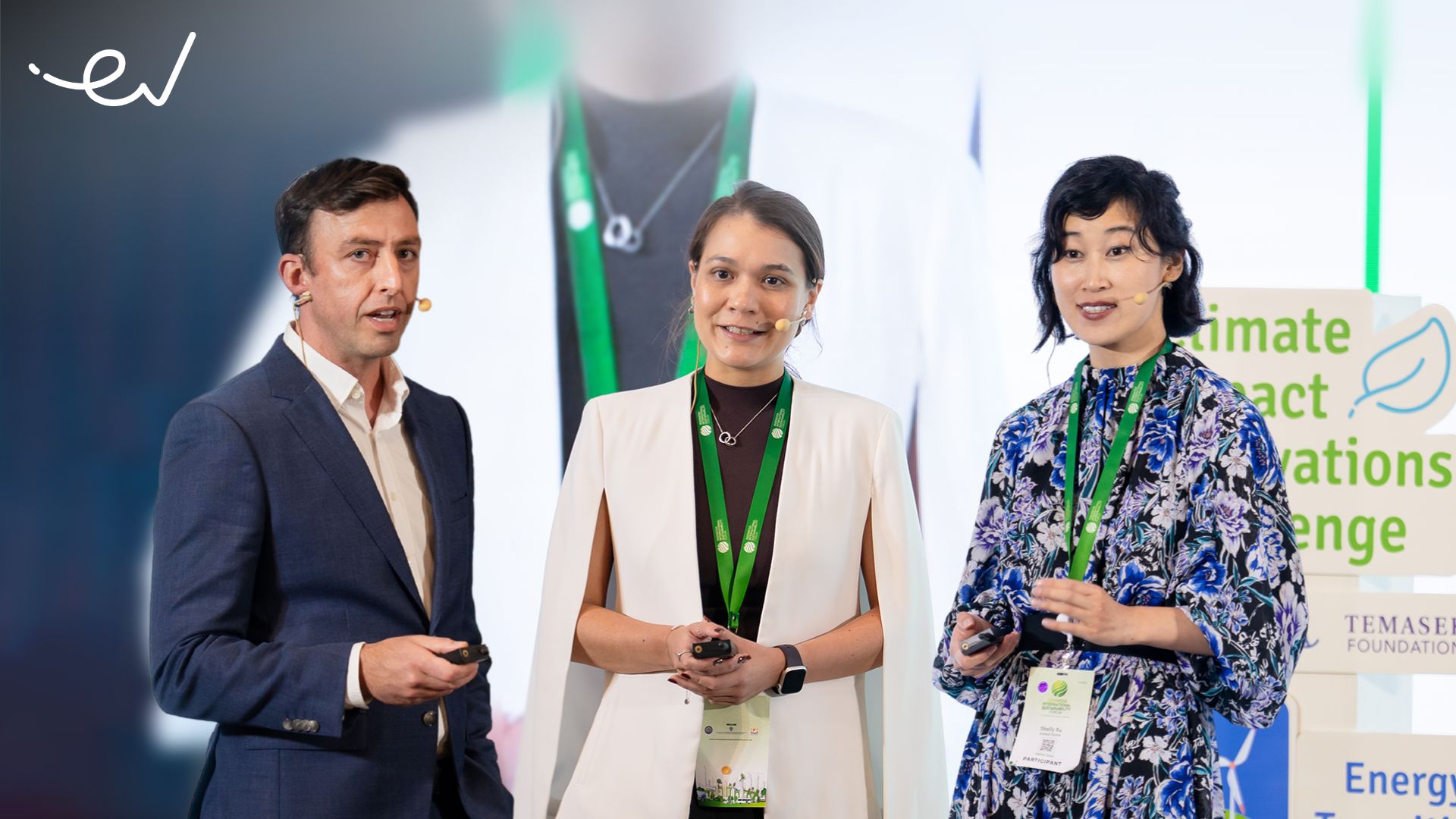Prior to being Co-Founder and Managing Partner at East Ventures, Willson Cuaca embarked on a career in cybersecurity as an iPhone developer in Singapore. On the other hand, Najwa Shihab, now an accomplished journalist and the Founder of media startup NARASI, started her journey from the ground up at a local TV station.
Neither had a head start in the entrepreneurial scene, but today, Willson and Najwa are prominent founders behind East Ventures and NARASI.
Willson believes entrepreneurship is a characteristic instead of a ‘final result.’ He likens entrepreneurship to the ‘Pareto Principle,’ where 20% of the underlying factors of an entrepreneur’s success come from childhood experiences, such as family, beliefs, friendships, and environment. These factors, according to Willson, will instill integrity, high fighting spirit, and flexibility in a person.
Najwa, who boasts 17 years of experience as a political journalist, admitted how being an entrepreneur is more cumbersome, especially when faced with arduous decisions and continuous changes.
Willson and Najwa shared their success stories at the Fortune Indonesia Summit 2024 in a session titled “What it Takes to Become Great” on Thursday, 7 March 2024, moderated by William Utomo, Co-founder and COO of IDN Media. Read their insightful conversation below.
The transcript of the panel discussion below has been edited for clarity and brevity.
A lot of entrepreneurs and investors know you as “The Unicorn Whisperer” or someone with the Midas touch; the companies under your belt will be successful and bring great impact on society. But, not many are familiar with your story. Could you tell us more about it?
Willson Cuaca: My story is actually simple. I’m purely a product of Indonesia. I spent my university life at Binus, not overseas. In 2001, I worked in Singapore in cybersecurity. At that time, cybersecurity was not as popular [as today]. If I remember correctly, I was one of four professionals with the highest certification in this field. In 2008, when the iPhone was first launched, I became the first iPhone developer in Singapore. After that, I developed an e-book reader for Gramedia. We sold this app to Kompas.
We recognized Indonesia’s potential in 2009. Indonesia has massive digital potential, but no one is working on it. There were three important factors during that time in Indonesia. First, of Indonesia’s 230 million citizens, the internet penetration was only 13%. That said, only 30 million were using the Internet, and that was as big as the whole of Malaysia. Second, western products such as Facebook and Twitter could easily make their way to Indonesia. The citizens adopt those apps because Bahasa Indonesia makes use of the alphabet the same way English does. Third, mobile internet. iPhones were expensive, but Android’s prices were getting friendlier. Combine these three things, and digitalization will skyrocket. But, what should we do? Eventually, we opened a small fund and started investing. We kept investing until we have around 300 portfolios now.
Looking back, what was it that we were trying to build? We were trying to build digital infrastructures in Indonesia. Digital infrastructures are all aspects related to digitalization, such as logistics, payment, and media distribution. However, was that potential already noticeable in 2009? No. Why is East Ventures able to withstand the test of time? Because we invest in founders, not businesses. If we invest in founders, even if the market keeps changing, they will drive the company to adapt to the new market. We’re also not too calculative on profit or loss, because if we are, we won’t be investing in anything until now. Or if we’ve just decided to invest now, it will be too late, because other people already did the job.
Najwa Shihab is known as someone who’s vocal, skillful in navigating issues, and very influential. Could you tell us a little about your struggles to be who you are now?
Najwa Shihab: I started really young. I found the courage to speak on important issues during my middle school days. At that time, I was the student council’s president. In my second year of high school, I got the opportunity to participate in a student exchange program for a year. This was a pivotal time that changed my life fundamentally. At that time, going overseas was seen as something expensive and difficult to achieve. This experience changed my life.
I feel very lucky to have a lot of opportunities to obtain qualities that are now my strength. I was also active in organizations during my university days. I then decided to choose this profession after going through so many things. I believe that there is no such thing as instant success.
I completed an internship at RCTI as a reporter before graduating. After that, I moved to Metro TV and started my career from scratch, from being a reporter, assistant producer, producer, executive producer, to having my own program. Before I attained prime-time broadcasts, my air time was at 2 in the morning. I started doing only press conferences before I was finally trusted to interview the nation’s most important person. Everything was done through processes. I started ever since I was 20, and it was 25 years ago. And I’m still doing this. I think the key is to know that nothing is instant. You have to earn it. Credibility is a result of consistency.
Both of you were not entrepreneurs when starting your careers, but now you are. Are entrepreneurs born or made?
Willson Cuaca: In my opinion, the word ‘entrepreneur’ doesn’t mean status and final result, but character. Entrepreneurship is actually very hard and nearly impossible to teach. Some of you might have heard the ‘Pareto Principle.’ 20% of what makes a successful entrepreneur comes from childhood, whether from family, belief, friendship, or environment. These are the factors that instill integrity, high fighting spirit, and flexibility in a person. East Ventures now has around 300 portfolios. It means that we have invested in 600-800 entrepreneurs. All successful entrepreneurs have similar patterns.
For example, East Ventures looks at three aspects: vision, strategies, and tactics. Najwa’s vision, for instance, is to spread independent news to the youth. That is a very clear vision, and she should always hold onto it. The strategy is to be independent through digitalization. Tactics, on the other hand, is something that we do day-to-day. Although the vision remains the same, the strategies can shift following the changing era. The same thing happened when East Ventures invested in IDN Media. They have a clear vision, which is to reach Gen Z and Millennials. East Ventures’ job is to find people with strong and clear characters, extensive vision, and give them opportunities through investments.
Najwa Shihab: I started NARASI 6 years ago after working as a political journalist for 17 years. Covering politics and catastrophes is not without its challenges. But I always say that those challenges were nothing compared to the hardships of being an entrepreneur. We need a lot of partners to survive as entrepreneurs.
For instance, East Ventures’ support towards IDN Media is very crucial. In my opinion, besides having a clear vision, the keys to entrepreneurship are having drive and grit. In this day and age, many people want to do the same thing, and every strategy can be copied off. Successful entrepreneurs have the hunger to prove that they can make it.
My experience as a journalist has helped me so much, because journalists are used to doing so much. If we want more information, we have to know a lot of people. Relations and networking are the most valuable currency for journalists. The same goes for entrepreneurship. The more relations we have, the greater the potential to collaborate with other parties. As an entrepreneur, although I’ve never had formal business experience, I’ve had the opportunity to ask the right things to extraordinary people in their respective fields. The ability to anticipate things that are always changing is also something I gained from being a journalist.
Many people are saying that the tech industry is going through a tech winter. What do you think of this?
Willson Cuaca: I will tell you a bit about how money works. Money will go where the highest returns are yielded. As a result of the interest rate increase in the US, a great amount of money was invested in bonds. Meanwhile, there were fewer investments in venture capital and startups, because these investments are high-risk and high-gain. Actually, Indonesia can’t always look at other countries, especially Western ones. We have to believe that Indonesia is the fourth biggest country in the world. This belief drives East Ventures to do what we’re doing.
Economic cycles happen every 10 years, but civilization cycles only occur every 100 years. In my opinion, Indonesia is heading towards the top, because our demographics will be taking off in a bit. We are at the right place, time, and age to harness this opportunity. The vision is for Indonesia to be big. The strategy is through digitalization. We will be efficient if we can make something 10 times cheaper and easier. If we are efficient, we will be more productive. There is a point where countries like China, South Korea, and Japan experienced population growth.
We have witnessed several industries experience disruption in the last 10-15 years, for instance, e-commerce, logistics, payment, and media. What’s next?
Willson Cuaca: There will always be cycles. Every digital economy in this world always begins with consumers before making its way to B2B, enterprises, and going back to consumers. Indonesia has just gone through the consumer trend with Tokopedia and Go-Jek. Eventually, the whole consumer market is getting educated. When East Ventures was established, there were only 30 million internet users. Now, the number’s spiked to 200 million. So, the delta is 170 million. Which country in this world has that kind of jarring difference? If there ever was an investor asking why they should invest in Indonesia, I will answer them with this fact. The population has to be massive to create a difference that big.
Do you share the same optimism with Willson on this, Najwa?
Najwa Shihab: I’m cautiously optimistic. Being optimistic doesn’t mean believing everything will be rainbows and sunshine. In my opinion, being optimistic means staying faithful to the process. When something is good, we support it. When it’s bad, we oppose it. There are many things that we need to anticipate, but there are also a lot of things to be cautious about: how we ensure that public spaces can flourish, power doesn’t inflate, citizens are not getting more impoverished, and equality can be achieved. Not only do we have to ensure that there’ll be free lunch, but also how education can be accessed from every corner of Indonesia. I share the same optimism, but I also feel that being vigilant in looking at things cannot be interpreted as being optimistic. We have to stay optimistic, but we also have to ensure that people’s voices can get amplified because it’s a different perspective.
Willson Cuaca: I want to add to this. Despite being optimistic, it’s important for us to make quality progress. It means we leave no one behind. East Ventures always monitors if digitalization is equitable in Indonesia. We’ve carried out research in all provinces, districts, and cities to find out whether or not digitalization improves people’s living standards. As Najwa said, the important thing is to achieve quality progress, not outrageous ones. I think it’s important to discuss these topics because everyone has different experiences, perspectives, and abilities. Some move left, while others move right, but we have to always look back and push everyone forward. So, making a move is our strength. Don’t just listen and fantasize, we have to make a move.
Willson, you often speak about “The Power of Three.” Could you tell us more about the meaning and benefit of this concept?
Willson Cuaca: In my profession, there’s only one thing I do every day, and that is making decisions. These decisions have to be made fast. So, most of them are very intuitive. For example, it only took 1-2 days to decide that we wanted to invest in IDN Media. The same goes for Tokopedia, Traveloka, and Ruangguru.
Eventually, I thought to myself, how can I transfer this ability to fellows at East Ventures so they can have the same ability, because, actually, intuition can be trained. I finally found the formula for decision-making. I categorize it into three things: data, engine, and output. There are three types of data. The data and information we understand will become knowledge. The knowledge we practice will be wisdom. There are three easy ways to select data. First, data should be processed fast. Second, data should be categorized correctly. Third, there should be patterns to these data and we don’t always have to learn new ones. After data is collected, we process it in an engine.
The first engine is the ‘Pareto Principle.’ Don’t do everything, just do 20%. These 20% are the most important things in life, and you will get an 80% output. The next engine is ‘The Law of Diminishing Return.’ Don’t do things repeatedly, because the results will be the same. There’s a point where repetition needs to stop. The last engine is ‘The Power of Three.’ I divide everything in my life into three, because three is my favorite number.
The most important number is actually one because it’s decisive. What’s better than one is 2, so you have two options. But sometimes, life is not that simple, so you have to have three options. When output is in our hands, it has to be protected by core values. At East Ventures, we have three core values. First, integrity. It means we do the right things even when no one is watching. Second, empathy. Whatever decision we take, we are still human, and we have to empathize with the person we’re talking to. Third, excellence. This is where economic values come into play. If the data and engine are correct and the output is protected, hopefully, we’ll make the right decisions.
Indonesia is said to be headed towards ‘Golden Indonesia’ in 2045. What should the youth do in preparation for this?
Najwa Shihab: I hope that the preparations are being done now. I feel that 2045 is seen as a year where we will suddenly wake up, and everything will be gold and glitter. What I’m worried about is that, if we don’t start now, what will happen in 2045 is just a reflection of what is happening today. We imagine that young people are more agile and competitive. But it has to start now, and we should be able to see a little progress through classrooms, public spaces, and through the elites. Can our classrooms enable that? Don’t let our classrooms banish differences in opinion, get too focused on lessons heavy on memorization, and even label kids who love to ask questions as naughty. The most important thing is for young people to be open-minded and not get overly sensitive. They don’t have to treat something different as an enemy.
Get used to observing things from various perspectives. Sometimes, you might be right. Other times, you might be wrong. The world is changing rapidly, we need young people who can change fast and study relentlessly. What we need is not the technical capabilities to master one thing, but patience and grit to be lifelong learners. The perseverance to always learn is key to surviving in 2045.
Willson Cuaca: First, self-awareness. It means that we realize our strengths and weaknesses. If we realize our strengths, we have to do more. If we know of our weaknesses, we have to learn. People with high self-awareness are almost always humble because they know what they can and can’t do. This person also likes to learn and trusts the process. Nothing is instant, just like Najwa said. Second, failure is delayed success. Don’t give up easily. Third, believe in compounding effects. The 1% change you do every day will yield 37 times the amount at the end of the year. Nothing is instant. Everything is done step-by-step.







